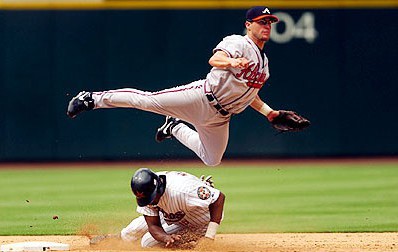Last week, my Trend of the Day was focused on FanDuel Pitchers Who Throw a Lot of Innings (and Win). I had much more to write than was reasonable to put in a TOTD, and so this present piece can be thought of as a continuation of or addendum to the earlier article on the subject.
This is the 54th installment of The Labyrinthian, a series dedicated to exploring random fields of knowledge in order to give you unordinary theoretical, philosophical, strategic, and/or often rambling guidance on daily fantasy sports. Consult the introductory piece to the series for further explanation.
Starting Pitchers Win Only One-Third of the Time
If you’re not familiar with Baseball-Reference.com, get familiar with it. Essentially a warehouse of MLB data, Baseball Reference has almost every stat you’d want. For instance, it has data on all starting pitchers going back for years, and if we dive into this data we find some interesting facts. Per the 2015 starting pitching data, we see that MLB starting pitchers win just over one-third of the games that they start: 34.4 percent to be exact. (They also lose about 35.0 percent of their games.)
Of course, this sample is based on only one year, but I’ll let you dig further for yourself. Look through the data at Baseball Reference. What I anticipate you’ll find is that, on average and in the aggregate, starting pitchers win (and lose) anywhere from 30 to 37 percent of their games.
I Repeat: Starting Pitchers Win Only One-Third of the Time
That fact is important. On FD, where wins provide a 12-point windfall, it makes sense to chase wins to a degree. At the same time, even if a team is favored by Vegas, DFS players would do well to remember that starting pitchers win only one-third of the time.
Too many DFS players automatically assume that when a team is favored, the pitcher for that team will pick up the win. It often works out that way — the correlation between team wins and starting pitcher wins is very high — but not every favored team wins and not every winning team has a victorious starting pitcher.
Too many DFS players are probably ignoring the simple fact that most starting pitchers do not win a majority of their starts.
Chase wins, but do so judiciously.
Starting Pitchers Rarely Average More Than Six Innings
Once you realize that, on average, starting pitching staffs rarely go beyond six innings, the win-loss-no decision ratios make intuitive sense. If starting pitchers last only about two-thirds of a game, then they should have decisions (wins or losses) about two-thirds of the time and no decisions one-third of the time.
I hope that you appreciate what this means.
Counting Cards and Starting Pitcher Wins
I grew up playing card games with my family, and as result I learned to count cards at a fairly young age. The premise of counting cards is simple. The further into a game you are, the greater the odds are that a card that hasn’t been played yet will be the next card drawn, and if you keep track of the cards that haven’t been played then you have a chance of knowing the odds.
At the beginning of a game, you have a 7.69-percent chance of any random card drawn being an ace. Halfway into the game, you have a 15.38-percent chance of drawing an ace if all four aces remain in the deck. With only eight cards left to deal, you have a 37.5-percent chance of getting an ace if three remain unplayed.
The longer a card stays in the deck, the likelier it is that it’ll be drawn next. Likewise, the longer a starting pitcher stays in the game, the likelier it is that he’ll get the win.
Everyone basically understands the longevity principle when it comes to cards, but not enough DFS players appreciate it when it comes to pitcher wins.
Pitches, Innings, Strikeouts, and Wins
A couple of weeks ago, Jay Persson wrote a great TOTD in which he reminded us that we should pay attention to pitch counts. A high pitch count correlates with a high Plus/Minus, which makes sense. The more pitches a guy throws, the more innings he is likely to accumulate, the more strikeouts he is likely to get, and the greater the odds are that he will get a win.
My sense is that most DFS players intuitively appreciate the correlations between pitch count, innings, and strikeouts. They probably underappreciate the correlations between pitch count, innings, and win probability. Don’t be one of those DFS players.
If you want to find a pitcher likely to win a game he starts, look for a pitcher who lasts deep into games. It also helps if he’s favored and can create outs for himself via strikeouts.
Finally, it helps if his name is Clayton Kershaw, a.k.a. #TurboTrend.
Obvious Action Item of the Day
Kershaw is pitching today. Start him.
———
The Labyrinthian: 2016, 54
Previous installments of The Labyrinthian can be accessed via my author page. If you have suggestions on material I should know about or even write about in a future Labyrinthian, please contact me via email, [email protected], or Twitter @MattFtheOracle.





